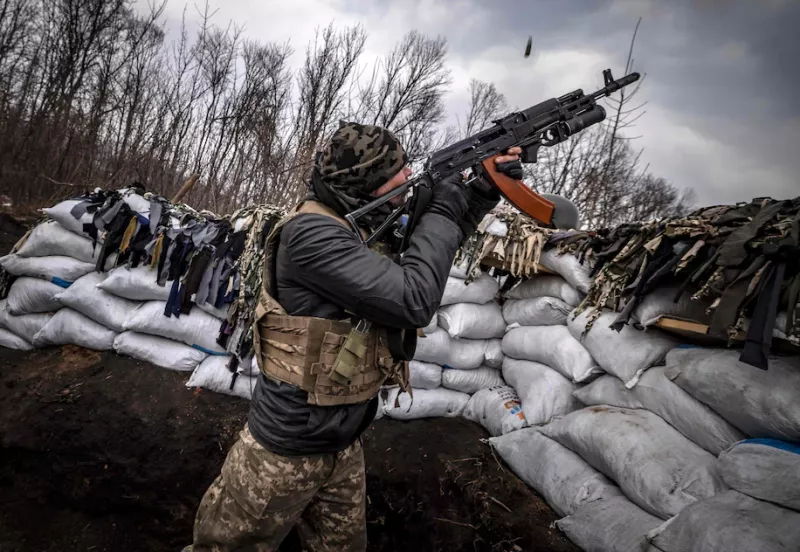
Some commentators on the Ukraine war — generally in the class of foreign policy realists — are ready for the denouement before the full story is played out.
In the beginning was a failure of deterrence. After years of passive Western reaction to his adventurism — in Georgia, Crimea, Syria and elsewhere — Vladimir Putin thought he could pursue a relatively costless invasion of Ukraine. It was a miscalculation, but not an irrational one. A swift and steely reaction by President Biden was probably not the outcome Putin’s intelligence services ranked as most likely. After having championed the abandonment of both Syria (as vice president) and Afghanistan (as president) to terrible fates, Biden’s fortitude would not have been assumed.
As the conflict began, foreign policy realists across the ideological spectrum thought (like many others) that the war would be a rout in Russia’s favor. This outcome would have had the virtue of strategic simplicity. The red line against Russian aggression could have been drawn at the inviolable borders of NATO countries. The invocation of Article 5 — the mutual-defense portion of the North Atlantic Treaty — would have obviated the need for difficult strategic choices. While few — apart from America’s extreme right — were rooting for it, Ukraine’s swift defeat would have limited the bloodshed and resulted in a comfortable clarity of costs and risks.
Yet Ukraine refused to cooperate in the story of its own collapse. A combination of brilliant national leadership by Volodymyr Zelensky, widespread patriotic courage, NATO-provided weapons and lumbering Russian incompetence has allowed David to stop Goliath in his tracks. But rather than being conveniently killed, the well-armed giant is pausing to refit, resupply and reconsider his options.
Among an increasingly vocal group of policy realists, this shockingly positive outcome overall remains a long-term defeat for U.S. interests. The argument goes like this: A bloody stalemate in Ukraine — featuring crimes such as the leveling of Mariupol and Kharkiv — is not only a humanitarian nightmare. Continuing this unwinnable war would cause radiating destabilization.
How long will Europe stay united against Putin when countries face energy shortages, lost jobs and the reality of accommodating millions more refugees beyond the 4 million estimated to have already fled? How will Britons react when they experience, say, a 50 percent or more increase in energy costs? Won’t the German advocates of appeasing Putin — who are only temporarily quieted — eventually remake their argument in an atmosphere of acute economic suffering?
The U.S. economy is not as dependent as Europe’s on its economic relationship with Russia. But won’t the disruption of global energy markets — resulting in higher prices at the gasoline pump — place tremendous political pressure on Biden? Might this economic dislocation help return one of Putin’s few remaining allies — Donald Trump — to power?
Some foreign policy experts also warn that crippling Russia might turn it into a terrorist state, like North Korea, while it is pushed ever closer to China for support.
“The main challenge today”, Samuel Charap of the Rand Corp. argued recently in Foreign Affairs, “is that Ukraine’s brave resistance — even combined with ever-greater Western pressure on Moscow — is highly unlikely to overcome Russia’s military advantages, let alone topple Putin. Without some kind of deal with the Kremlin, the best outcome is probably a long, arduous war that Russia is likely to win anyway”. Such a protracted conflict, he warned, would “cement the current extreme level of hostility between Russia and the West”, which would undermine U.S. interests in regional and global stability over the long term.
“However distasteful it may be to reach a compromise with Putin after the carnage he has unleashed”, continued Charap, “the United States should work to secure a negotiated settlement to the conflict sooner rather than later”.
There are at least three problems with this approach:
First, any likely, hurried peace that is forced on Ukrainians would almost certainly involve territorial concessions to Russia. This would constitute another massive failure of deterrence, essentially inviting Putin to threaten and intimidate non-NATO countries.
Second, while the gung-ho provision of weapons to the Ukrainian army could eventually raise some risk of direct NATO conflict with Russia, we don’t appear close to that point yet. Biden has been correct to avoid a no-fly zone, but he is not yet close to exhausting the number and sophistication of missiles that could be responsibly sent. Missiles to take out more planes, more ships, more tanks. NATO needs to test the further limits of possible victory against Russia in Ukraine. It hasn’t yet.
Third, this might be our generation’s best, and perhaps only, chance to enforce true limits on the greatest threat to European and world peace. Under Putin, Russia is already a rogue terrorist state, closely aligned with China. How will the effective accommodation of Russia’s barbaric aggression make global stability more likely?
Rallying their peoples to accept the temporary economic burdens required to confront Putin is now the main challenge for European leaders and the U.S. president. It will not be easy, but it will certainly be easier than following the Zelensky example.
Michael Gerson is a nationally syndicated columnist who appears twice weekly in The Post.
